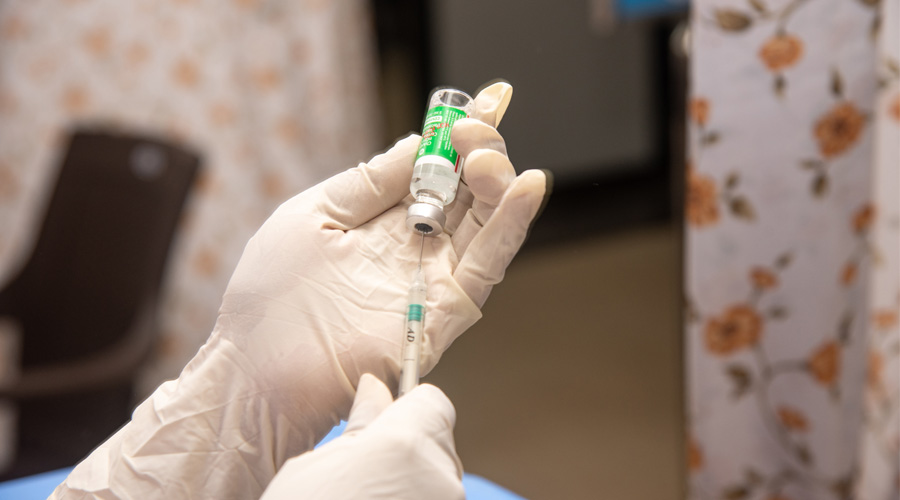Kerala has been the odd man out in India’s fearsome Covid-19 pandemic. Now a government report shows the state’s playing true to form again with 82.6 per cent of the population having Covid-19 antibodies but the number of daily new cases coming down much more slowly than might have been expected.
The government’s detailed seropositivity study which looks at how many people have Covid-19 antibodies studied different groups like tribals, antenatal women, children and also people living on the coast. It found that more than 80 per cent of each group had high seropositivity levels. People show Covid-19 antibodies when they have either had the illness or been vaccinated against it.
Crucially, the study says that unvaccinated people had 70 per cent seropositivity, indicating the widespread nature of the infections in the state even before the vaccinations had reached a high level. Natural immunity is considered stronger protection than that afforded by vaccinations.
Kerala reported over 11,000 new cases daily on Wednesday after falling to around 7,000 for a few days. Test positivity ratios are also at around 10 per cent, which is still quite high. About 94 per cent of the adult population has received one Covid-19 vaccination and 48 per cent has received two jabs.
By contrast, Delhi, which according to one study had seropositivity levels of 86 per cent two months ago, reported only 35 new cases on Monday. Virologists and other medical researchers have been puzzled why Kerala with similarly high seropositivity levels is still having a large number of new cases daily.
A second Death Analysis Report by the Kerala Government shows that out of 9,195 deaths between June 18, 2021, and September 3, 52.52 per cent had either hypertension or diabetes mellitus or both. Also, 12 per cent of people who died suffered from coronary artery disease and another 8.19 per cent had chronic kidney disease.
First of a kind survey
The Seropositivity report by the Kerala Government Department of Health and Family Welfare looked at six different segments including children between the ages of five and 17. The report says: “This survey is perhaps the first of its kind in India which also focuses on specific vulnerable populations like the Antenatal women, Tribal, coastal and urban slum populations.”
This is the third seroepidemiological study carried out in Kerala since the pandemic began. The first report for the period May-June 2020 found there was not much community transmission.
The second in February 2021 found “overall seroprevalence in the community” was at 10.76 per cent. An Indian Council of Medical Research (ICMR) report in May 2021 found that Kerala seroprevalence estimates were around 44.4 per cent. This was at a time when the national seroprevalence was at 67.6 per cent.
Children not showing symptoms
Significantly, the study of children between five and 17 found that 40.2 per cent of them had SARS CoV-2 IgG antibodies. In the state’s Kasargod district which was one of the earliest to be badly hit by the pandemic, 63.3 per cent of children showed seropositivity. Similarly, Alappuzha district had 55 per cent seropositivity and Malappuram 50.9 per cent. In the thinly populated Wayanad district, only 7.9 per cent of the children showed seropositivity.
The study on children assumes importance because the Kerala government is planning to open schools on November 1. However, this may not happen because of the severe floods in the state, says a state government official.
The report also points out that children often do not show symptoms or have only mild symptoms so are often not tested for Covid-19. It says: “Infections among children are not adequately captured in our routine testing data. Estimation of infection rate among children thus becomes an important epidemiological exercise, especially in the context of relaxation in Covid-19 restrictions.”
Children who lived in urban areas had higher seropositivity than youngsters from rural areas. Also, children who had been in contact with Covid-19 patients had higher levels of seropositivity.
Vaccinations crucial
In a warning to people resisting the vaccinations, the death report says that 90 per cent of the deaths were of people who had not been vaccinated. In sharp contrast, only 3 per cent of the deaths were people who had had both jabs.
Kerala has earned itself the reputation as the state where the medical system was never overwhelmed by the case numbers and around 80 per cent of the people who were fatally afflicted, died in ICUs. A huge 92.82 per cent of people died in hospitals and only 5.59 per cent at home. The remainder appears to have died in transit.
The greater burden of the pandemic was taken by the government hospitals so 62.68 per cent of the deaths took place in these institutions. The private hospitals had 36.33 per cent of the deaths.
Kerala has a densely populated coastline of over 500km and it’s perhaps not surprising that the people tested from these areas had seropositivity levels of 87.7 per cent. Similarly, out of the urban slum-dwellers tested, 85.3 per cent had antibodies. At a slightly lower level, the tribals, many of whom live in relatively remote areas, showed seropositivity levels of 78.2 per cent.
New study offers hope
A study in the scientific journal Current Issues in Molecular Biology may suggest some clues to the nature of the deaths noted in the second Kerala report. Researchers have discovered the infection of cells with the Covid-causing coronavirus SARS-CoV-2 leads to increased levels of a “don’t destroy me” protein called CD47 on cell surfaces.
The data suggested high virus-induced CD47 levels and age contributed to severe Covid-19 by preventing the immune system from mounting a strong defence and increasing disease-associated organ damage. Crucially, high CD47 levels are linked with diabetes and also contribute to high blood pressure, a big risk for Covid-19 complications like heart attacks, stroke and kidney disease.
The good news is that since medicines targeting the reduction of CD47 levels are being developed, the discovery by the researchers at the University of Kent's School of Biosciences and the Institute of Medical Virology at Goethe-University may result in better treatments. “We may have identified a major factor associated with severe COVID-19. This is a huge step in combating the disease and we can now look forward to further progress in the design of therapeutics,” said Professor Martin Michaelis at the University of Kent.










